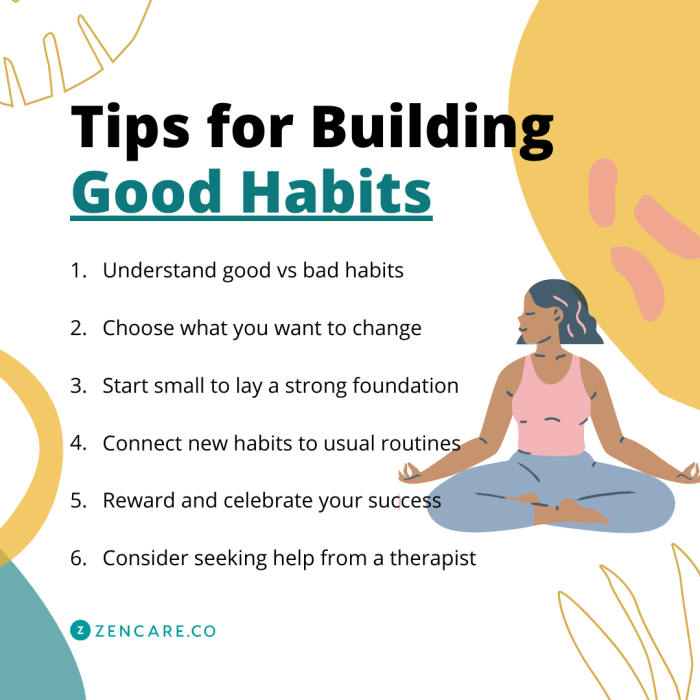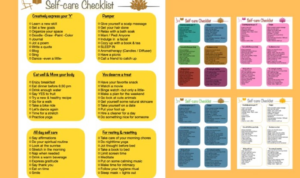Building Healthy Habits is all about making positive changes that stick, from physical fitness to mental well-being. Get ready to dive into a world of wellness like never before!
In this guide, we’ll explore the different facets of healthy habits and provide practical tips to help you kickstart your journey towards a healthier lifestyle.
Introduction to Building Healthy Habits
Building healthy habits involves adopting behaviors that promote overall well-being and improve quality of life. These habits contribute to physical, mental, and emotional health, leading to a more balanced and fulfilling lifestyle.
Benefits of Healthy Habits
- Improved physical health through regular exercise and balanced nutrition.
- Enhanced mental well-being by reducing stress and increasing focus.
- Boosted energy levels and productivity throughout the day.
- Reduced risk of chronic diseases such as heart disease and diabetes.
Common Healthy Habits to Adopt
- Drinking an adequate amount of water daily to stay hydrated.
- Eating a balanced diet rich in fruits, vegetables, and whole grains.
- Engaging in regular physical activity, such as walking, jogging, or yoga.
- Prioritizing sleep and ensuring a consistent sleep schedule.
- Practicing mindfulness and stress management techniques.
Physical Health Habits: Building Healthy Habits

Regular physical exercise plays a crucial role in maintaining a healthy lifestyle. It not only helps in managing weight but also boosts mood, strengthens muscles, and improves overall well-being.
Types of Physical Activities, Building Healthy Habits
- Cardiovascular exercises like running, swimming, or cycling help improve heart health and stamina.
- Strength training, such as weightlifting or bodyweight exercises, builds muscle mass and increases metabolism.
- Flexibility exercises like yoga or stretching enhance mobility and reduce the risk of injuries.
- Balance exercises, including tai chi or stability training, help prevent falls and maintain stability.
Consistency for Long-Term Benefits
Regularly engaging in physical activities not only improves physical health but also contributes to long-term benefits. Consistency in exercise routines helps in maintaining a healthy weight, reducing the risk of chronic diseases like diabetes and heart disease, and enhancing overall quality of life. Remember, small steps towards building physical health habits can lead to significant improvements in the long run.
Nutrition and Healthy Eating Habits
Eating right is a major key in building those healthy habits for a strong body and mind. Let’s dive into the world of nutrition and how it can make a huge impact on your overall well-being.
Key Components of a Balanced Diet
- Protein: Helps build and repair tissues, and is essential for muscle growth. Sources include lean meats, poultry, fish, beans, and nuts.
- Carbohydrates: Provide energy for daily activities. Opt for complex carbs like whole grains, fruits, and vegetables over refined sugars.
- Fats: Important for brain function and hormone production. Choose healthy fats like avocados, nuts, seeds, and olive oil.
- Vitamins and Minerals: Essential for various bodily functions. Get a variety of colorful fruits and vegetables to ensure you’re getting a range of nutrients.
- Water: Stay hydrated for optimal body function. Aim for at least 8 glasses a day.
Tips for Incorporating More Fruits and Vegetables
- Start your day with a fruit smoothie or add berries to your breakfast cereal.
- Snack on cut-up veggies like carrots, cucumbers, or bell peppers with hummus or yogurt dip.
- Add extra veggies to your meals like spinach in your omelet or zucchini in your pasta sauce.
- Keep a bowl of fresh fruit on your counter for easy access to healthy snacks.
- Experiment with different fruits and vegetables to discover new flavors and textures.
Mental Health and Well-being
Maintaining mental health is just as important as physical health when it comes to building healthy habits. The mind and body are interconnected, and taking care of your mental well-being can have a positive impact on your overall health.
Reducing Stress and Improving Mental Well-being
- Practice relaxation techniques such as deep breathing, meditation, and yoga to reduce stress levels.
- Engage in regular physical activity to release endorphins and boost your mood.
- Establish a healthy work-life balance to prevent burnout and promote mental well-being.
- Connect with friends and family for emotional support and social interaction.
- Seek professional help if you are feeling overwhelmed or struggling to cope with stress.
Importance of Self-care Practices
- Set boundaries to protect your mental health and prioritize self-care activities.
- Engage in activities that bring you joy and relaxation, such as hobbies or creative outlets.
- Practice mindfulness and stay present in the moment to reduce anxiety and improve mental clarity.
- Get an adequate amount of sleep to support cognitive function and emotional well-being.
- Remember to take breaks and recharge when needed to prevent mental exhaustion.
Creating a Routine

Establishing a daily routine is crucial for building healthy habits as it provides structure, consistency, and accountability to your wellness journey. By incorporating healthy habits into your routine, you are more likely to stick to them over time and see positive results in your physical and mental well-being.
Significance of Having a Daily Routine
- Having a routine helps you prioritize your health and well-being by setting aside dedicated time for exercise, meal preparation, self-care, and other healthy habits.
- Consistent routines can reduce stress and anxiety by creating a sense of predictability and stability in your daily life.
- Establishing a routine can also improve your sleep quality, energy levels, and overall productivity throughout the day.
Tips for Establishing a Sustainable Routine
- Start small and gradually add healthy habits to your routine to avoid feeling overwhelmed or burnt out.
- Set specific goals and create a schedule that includes time blocks for each healthy habit, making it easier to track your progress and stay on track.
- Find a routine that works for you and fits your lifestyle, incorporating activities that you enjoy and look forward to each day.
- Stay flexible and be willing to adjust your routine as needed to accommodate changes in your schedule or priorities.
Impact of Consistency and Discipline
- Consistency is key in maintaining a routine as it helps reinforce healthy habits and make them a natural part of your daily life.
- Discipline plays a crucial role in sticking to your routine, especially on days when motivation is low or obstacles arise.
- By prioritizing consistency and discipline, you can build resilience and perseverance in the face of challenges, ultimately leading to long-term success in your wellness journey.


